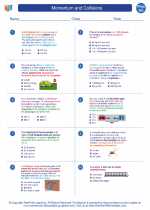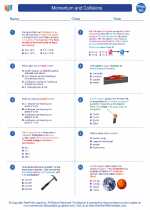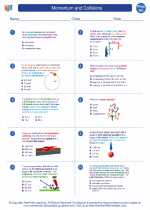Momentum and Collisions -> matter
Matter
Matter is anything that has mass and occupies space. It is made up of tiny particles called atoms and molecules. Matter exists in various forms such as solids, liquids, and gases. The study of matter is an important part of physics and chemistry.
Properties of Matter
Matter has several properties that can be used to describe and classify it. These properties include:
- Mass: The amount of matter in an object. It is measured in kilograms (kg) or grams (g).
- Volume: The amount of space occupied by matter. It is measured in cubic meters (m3) or cubic centimeters (cm3).
- Density: The ratio of mass to volume. It is calculated as density = mass/volume and is measured in kilograms per cubic meter (kg/m3) or grams per cubic centimeter (g/cm3).
- State: The physical form of matter, such as solid, liquid, or gas.
- Texture: The feel or appearance of a substance, such as smooth, rough, or powdery.
- Color: The visual appearance of a substance based on the way it reflects or emits light.
States of Matter
Matter can exist in three main states: solid, liquid, and gas.
Solid:
Solids have a definite shape and volume. The particles in a solid are closely packed together and vibrate in fixed positions. They have strong intermolecular forces that hold them in place.
Liquid:
Liquids have a definite volume but take the shape of their container. The particles in a liquid are close together but can move past each other. They have weaker intermolecular forces compared to solids.
Gas:
Gases have neither a definite shape nor a definite volume. The particles in a gas are far apart and move freely. They have very weak intermolecular forces.
Changes in Matter
Matter can undergo physical and chemical changes.
Physical Changes:
Physical changes do not alter the chemical composition of a substance. Examples include changes in state (melting, freezing, vaporization), changes in shape, and changes in size.
Chemical Changes:
Chemical changes result in the formation of new substances with different chemical properties. Examples include combustion, rusting, and fermentation.
Study Guide
When studying matter, it is important to understand the properties and behavior of different types of matter. Here are some key concepts to focus on:
- Understand the difference between mass and weight. Mass is the amount of matter in an object, while weight is the force exerted on an object due to gravity.
- Learn how to calculate density using the formula density = mass/volume.
- Study the behavior of solids, liquids, and gases under different conditions of temperature and pressure.
- Explore the ways in which matter can change through physical and chemical processes.
- Practice identifying and describing the properties of different substances based on their appearance and behavior.
By mastering these concepts, you will develop a solid understanding of matter and its role in the physical world.
[Matter] Related Worksheets and Study Guides:
.◂Physics Worksheets and Study Guides High School. Momentum and Collisions

 Worksheet/Answer key
Worksheet/Answer key
 Worksheet/Answer key
Worksheet/Answer key
